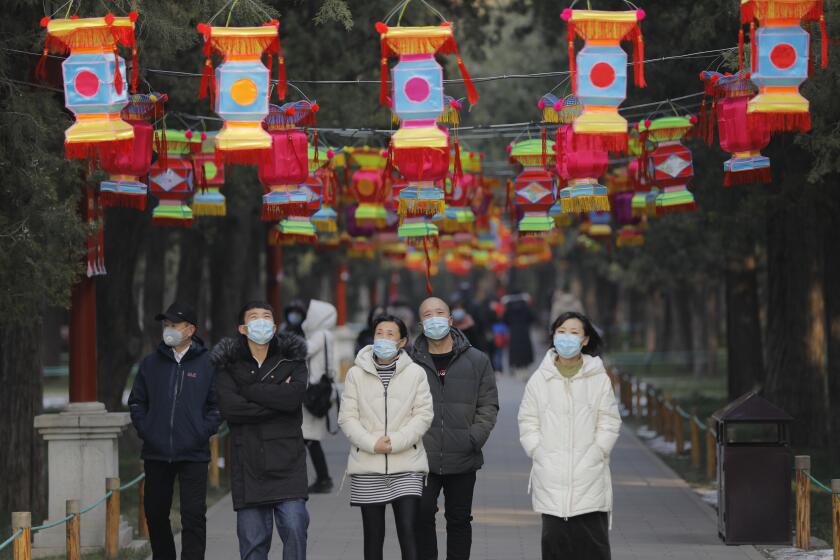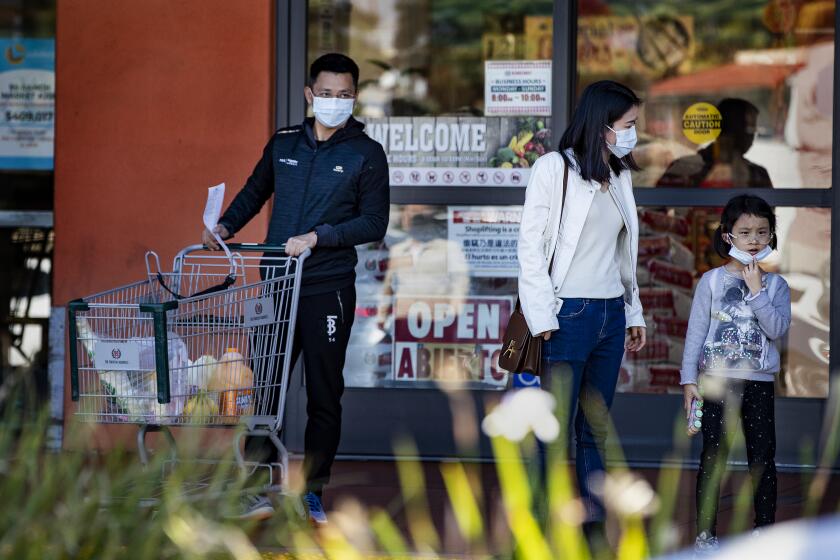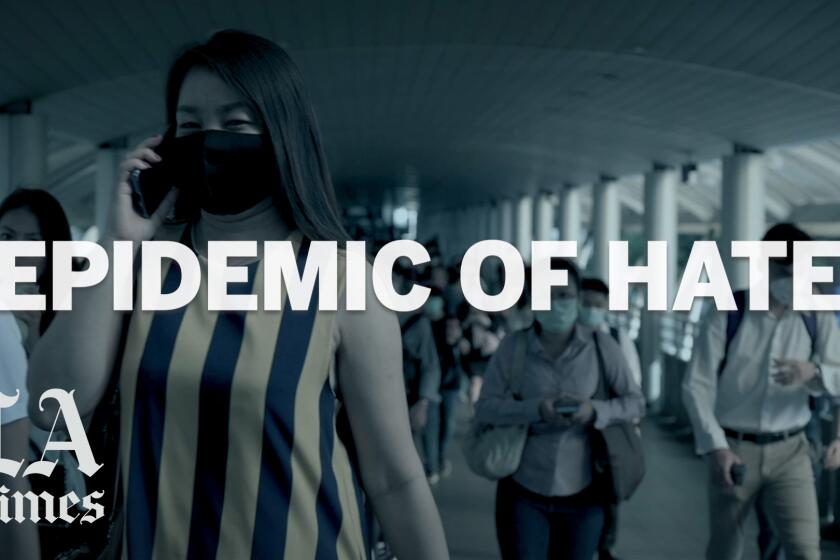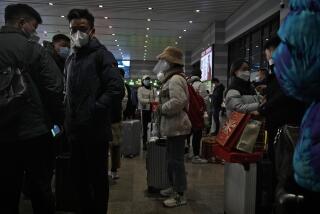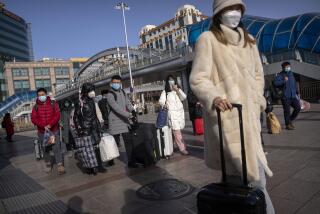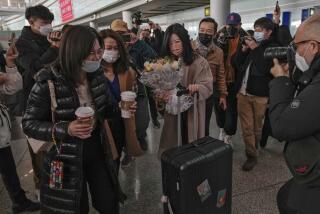Hong Kong reports coronavirus death as workers strike at hospitals
- Share via
Hong Kong hospitals cut services as thousands of medical workers went on strike for a second day Tuesday to demand the border with mainland China be shut completely, as a new strain of coronavirus caused its first death in the semiautonomous territory and authorities feared it was spreading locally.
All but two of Hong Kong’s land and sea crossings with the mainland were closed at midnight after more than 2,000 hospital workers went on strike Monday. Hong Kong health authorities reported two additional patients without any known travel to the virus epicenter, bringing the number of locally transmitted cases up to four.
The growing caseload “indicates significant risk of community transmission” and could portend a “large-scale” outbreak, said Chuang Shuk-kwan, head of the communicable disease branch at the Center for Health Protection.
More than 7,000 health personnel joined the strike Tuesday, according to the Hospital Authority Employees’ Alliance, the strike organizer.
Hong Kong’s Hospital Authority said it was cutting back services because “a large number of staff members are absent from duty” and “emergency services in public hospitals have been affected.”
Hong Kong was hit hard by SARS, or severe acute respiratory syndrome, in 2002-03, an illness from the same virus family as the current outbreak. Trust in Chinese authorities has plummeted following months of antigovernment protests in the Asian financial hub.
The territory’s beleaguered leader, Carrie Lam, criticized the strike and said the government was doing all it could to limit the flow of people across the border.
“Important services, critical operations have been affected,” including cancer treatment and care for newborns, Lam told reporters. “So I’m appealing to those who are taking part in this action that let’s put the interests of the patients and the entire public health system above all other things.”
The leader of the nearby gambling enclave of Macao asked the city’s casino bosses to suspend operations to prevent further infections after a worker at one of the resorts tested positive for the virus. Macao has recorded 10 cases in all.
The mainland’s latest figures of 425 deaths and 20,438 confirmed infections of the new strain of coronavirus were up sharply from the previous day. Outside mainland China, at least 180 cases have been confirmed, including two fatalities, one in Hong Kong and the other in the Philippines.
The patient who died in Hong Kong was a 39-year-old man who had traveled to Wuhan, the mainland city where the outbreak started. The Hospital Authority said Tuesday he had preexisting health conditions but did not give details.
Britain and France advised against nonessential travel to China and urged their citizens there to leave if they can. Air France has stopped all flights to and from China. France has six confirmed cases of the virus, and Britain has two.
Belgium reported its first case, one of nine of its citizens evacuated from Wuhan last weekend, and Iran joined the growing number of countries arranging such flights.
The Korea Centers for Disease Control and Prevention said a 42-year-old South Korean woman tested positive for the virus days after she returned from a trip to Thailand with chills and other symptoms. It is South Korea’s 16th case.
Thailand confirmed six more cases, raising its total to 25, the highest outside China. Two of the new cases were motorcycle taxi drivers who had driven for Chinese tourists. Earlier a Thai taxi driver was also diagnosed with the virus. The cases are concerning because they suggest the virus can spread more easily between people.
World Health Organization officials reported slower progress than expected in equipping laboratories across Africa to test for the new virus. No confirmed cases have been reported on the continent, but WHO health security advisor Dr. Ambrose Talisuna said the risk is “very, very high.”
China has struggled to maintain supplies of face masks, along with protective suits and other items, as it seeks to enforce temperature checks at homes, offices, shops and restaurants, require masks be worn in public and keep more than 50 million people from leaving home in Wuhan and neighboring cities.
The European Union office in Beijing said member states have shipped 12 tons of protective equipment to China, with more on the way.
Germany’s Lufthansa became the latest international airline to suspend flights to China, and several countries are barring Chinese travelers or people who passed through China recently. Japan Airlines and All Nippon Airways said they were cutting back flights to several Chinese cities from mid-February to late March.
In Wuhan, patients were being transferred to a new 1,000-bed hospital that was built in just 10 days, its prefabricated wards equipped with state-of-the-art medical equipment and ventilation systems. A 1,500-bed hospital also specially built is due to open soon.
Elsewhere in Wuhan, authorities were converting a gymnasium, exhibition hall and cultural center into hospitals with a total of 3,400 beds to treat patients with mild symptoms. Television video showed beds placed in tight rows in cavernous rooms without any barriers between them.
Authorities hope that will help relieve what is being described as an overwhelmed public health system in Wuhan and surrounding areas.
One man, Fang Bin, said he saw wards so crowded during a visit to the city’s No. 5 Hospital on Saturday that some patients were forced to sit on the ground.
“There are too many patients, it’s overcrowded,” Fang told the Associated Press. He said he was taken from his home and questioned by police after he posted a video of what he saw online.
Such scenes have revived memories of the SARS outbreak that began in China and spread worldwide. The new virus is believed to be much less virulent, however.
The fatality rate, at 2.1%, is basically stable, Jiao Yahui, a National Health Commission official, said at a news conference. More than 80% of the dead were over 60 years old, and more than 75% had an underlying disease, she said.
Japanese officials were conducting medical checks on more than 3,000 people aboard a Japanese-operated cruise ship after a passenger tested positive after leaving the vessel while it was in Hong Kong.
More to Read
Sign up for Essential California
The most important California stories and recommendations in your inbox every morning.
You may occasionally receive promotional content from the Los Angeles Times.
